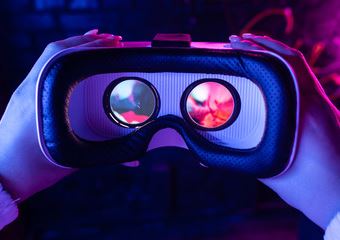
College can be demanding, and up to one-third of college students report feeling highly stressed. High stress levels can be a significant problem since a third of all college students report current or past mood, anxiety, or substance use disorders which can be retriggered or worsened by stress.
Mindfulness training can effectively reduce stress, but many students who enroll in mindfulness programs drop out before completion. Virtual reality (VR) technology has shown promise to improve learning, and may perhaps increase treatment adherence.
Mondrego-Alarcón et al. [Behaviour Research and Therapy] compared the relative efficacy of mindfulness versus relaxation training in reducing college student stress, and explored whether VR added to the mindfulness program reduces attrition.
The researchers randomly assigned 280 Spanish college students (79% female; average age = 22 years) to a standard mindfulness program, a VR-enhanced mindfulness program, or an active relaxation control. All groups met in person once weekly for six weeks. The mindfulness programs emphasized mindfulness and self-compassion using the body scan, and sitting, walking, movement, and self-compassion meditations.
The standard mindfulness condition met in 90-minute group sessions, while the VR-enhanced mindfulness condition met in 75-minute group sessions coupled with brief individual VR-guided meditations.
The body scan VR-meditation included a visual simulation of the human body which successively highlighted body parts as participants attended to those parts. Another VR meditation involved a virtual nature walk with participants mindfully observing their thoughts.
The relaxation control group utilized progressive muscle relaxation and visual imagery but did not use VR. All participants were assessed at baseline, post-treatment, and 6-month follow-up on the primary self-report measure of perceived stress as well as on the secondary outcomes.
The results show that, relative to the relaxation group, mindfulness (d=-0.72) and VR-enhanced mindfulness (d=-0.59) groups showed less perceived stress after intervention. This superiority remained at 6-month follow-up. The effect was dose dependent for mindfulness—the more sessions participants attended, the less their stress—but not for relaxation. Increases in mindfulness and self-compassion both contributed to decreased stress.
At post-treatment, the standard mindfulness group also showed significantly greater improvements on the secondary outcome measures of trait anxiety (d = -.90), emotional suppression (d = -0.71), mindfulness (d = 1.01), and self-compassion (d = .1.10) than the relaxation group.
These relative improvements persisted at 6-month follow-up and were joined by additional improvements in state anxiety (d = -1.37), affect balance (d = 1.02), academic engagement (d = 1.14) and burnout (d = -1.60). The VR-enhanced mindfulness group performed similarly on these measures but did not outperform the standard mindfulness group.
VR-enhanced participants had significantly better attendance than standard mindfulness participants, who in turn had significantly better attendance than relaxation participants. Ninety-six percent of the VR-enhanced group attended at least half of all sessions, compared with 83% of the standard mindfulness and 70% of the relaxation group.
The study shows mindfulness training to be superior to relaxation training in reducing stress in college students. Adding VR correlates with improved attendance in this younger sample, but did not yield superior efficacy on stress reduction.
The study is limited by its reliance on self-report measures, and inability to determine whether any novel activity for young adults like VR would increase motivation to attend a behavioral intervention.
Reference:
Modrego-Alarcón, M., López-del-Hoyo, Y., García-Campayo, J., Pérez-Aranda, A., Navarro-Gil, M., Beltrán-Ruiz, M., Morillo, H., Delgado-Suarez, I., Oliván-Arévalo, R., & Montero-Marin, J. (2021). Efficacy of a mindfulness-based programme with and without virtual reality support to reduce stress in university students: A randomized controlled trial. Behaviour Research and Therapy.
Link to study